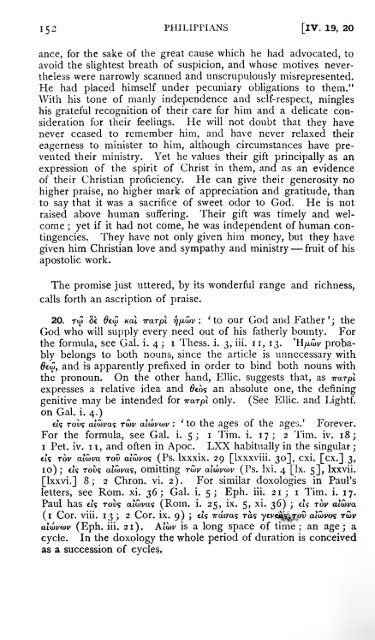Philippians and Philemon - MR Vincent - 1906.pdf
Philippians and Philemon - MR Vincent - 1906.pdf
Philippians and Philemon - MR Vincent - 1906.pdf
You also want an ePaper? Increase the reach of your titles
YUMPU automatically turns print PDFs into web optimized ePapers that Google loves.
152 PHILIPPIANS [IV. 19, 20<br />
ance, for the sake of the great cause which he had advocated, to<br />
avoid the sHghtest breath of suspicion, <strong>and</strong> whose motives nevertheless<br />
were narrowly scanned <strong>and</strong> unscrupulously misrepresented.<br />
He had placed himself under pecuniary obligations to them."<br />
With his tone of manly independence <strong>and</strong> self-respect, mingles<br />
his grateful recognition of their care for him <strong>and</strong> a delicate consideration<br />
for their feehngs. He will not doubt that they have<br />
never ceased to remember him, <strong>and</strong> have never relaxed their<br />
eagerness to minister to him, although circumstances have prevented<br />
their ministry. Yet he values their gift principally as an<br />
expression of the spirit of Christ in them, <strong>and</strong> as an evidence<br />
of their Christian proficiency. He can give their generosity no<br />
higher praise, no higher mark of appreciation <strong>and</strong> gratitude, than<br />
to say that it was a sacrifice of sweet odor to God. He is not<br />
raised above human suffering. Their gift was timely <strong>and</strong> welcome<br />
; yet if it had not come, he was independent of human contingencies.<br />
They have not only given him money, but they have<br />
given him Christian love <strong>and</strong> sympathy <strong>and</strong> ministry — fruit of his<br />
apostolic work.<br />
The promise just uttered, by its wonderful range <strong>and</strong> richness,<br />
:<br />
calls forth an ascription of praise.<br />
20. . God who will supply every need out of his fatherly bounty. For<br />
the formula, see Gal. i. 4 ; i Thess. i. 3, iii. 11, 13. probably<br />
belongs to both nouns, since the article is unnecessary with<br />
, <strong>and</strong> is apparently prefixed in order to bind both nouns with<br />
the pronoun. On the other h<strong>and</strong>, Ellic. suggests that, as<br />
expresses a relative idea <strong>and</strong> ^eos an absolute one, the defining<br />
* to our God <strong>and</strong> Father ' ; the<br />
genitive may be intended for only. (See EUic. <strong>and</strong> Lightf.<br />
on Gal. i. 4.)<br />
? €15 (Ps. Ixxxix. 29 [Ixxxviii. 30], cxi. [ex.] 3,<br />
10); £1? Toiis ?, omitting (Ps. Ixi. 4 [Ix. 5], Ixxvii.<br />
cis Tovs? :<br />
' to the ages of the ages.' Forever.<br />
For the formula, see Gal. i. 5 ;<br />
I Pet. iv. IT, <strong>and</strong> often in Apoc.<br />
i Tim. i. 17; 2 Tim. iv. 18;<br />
LXX habitually in the singular;<br />
[Ixxvi.] 8 ; 2 Chron. vi. 2). For similar doxologies in Paul's<br />
letters, see Rom. xi. 36; Gal. i. 5 ; Eph. iii. 21 ; i Tim. i.<br />
Paul has «is (Rom. i. 25, ix. 5, xi. 36) ; cti<br />
( Cor. viii. 13 ; 2 Cor. ix. 9) ; tis ? yeveii^j,jov<br />
17.<br />
(Eph. iii. 2i). is a long space of time; an age; a<br />
cycle. In the doxology the whole period of duration is conceived<br />
as a succession of cycles,





